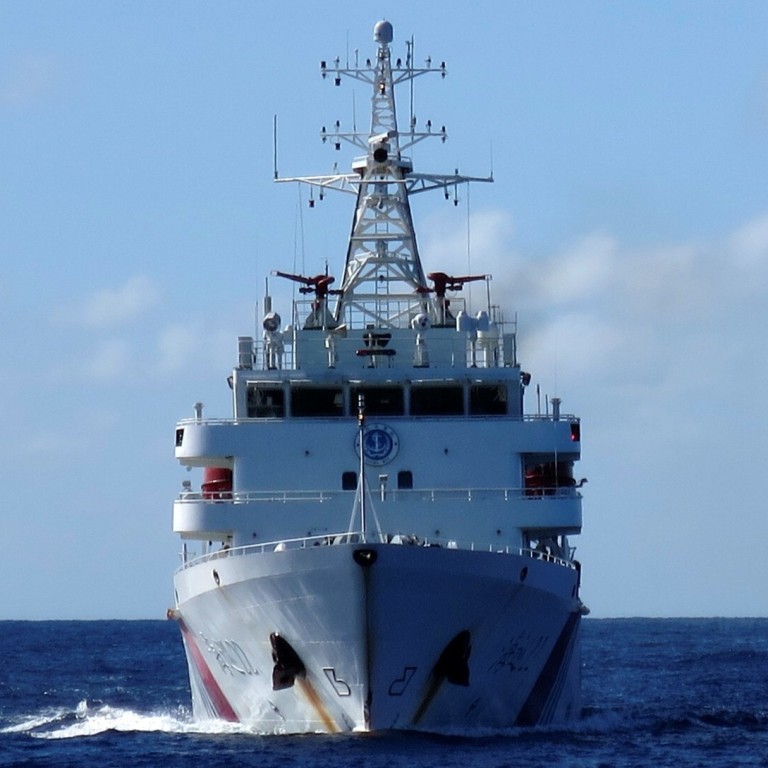
In South China Sea, Philippines fights itself over Beijing’s coastguard law
- Foreign Secretary Teodoro Locsin Jnr rubbishes suggestion by presidential spokesman that Manila could take Beijing to an international tribunal
- Discord amid silence from Duterte suggests confusion in Manila’s response to a law critics fear will be used to enforce Beijing’s territorial claims
Philippine fishermen may have branded China’s new coastguard law a “virtual declaration of war”, but so far most of the fighting talk from Manila has been infighting.
Foreign Secretary Teodoro Locsin Jnr rubbished a suggestion by the presidential spokesperson Harry Roque on Monday that Manila was considering taking China to the International Tribunal for the Law of the Sea over the matter.

Undaunted, Roque fired back on Tuesday that he “loved” Locsin too – referring to him as a “Tisoy” or “cute mestizo” – adding that as a past president of the Asian Society of International Law he knew what he was talking about.
Concern over the new law has grown since the Chinese research ship Jia Geng entered Philippine waters last week without permission.
Two years ago, in August 2019, Duterte had ordered all foreign vessels intending to sail through Philippine waters to first seek permission from Philippine authorities. “Either we get a compliance in a friendly manner, or we enforce it in an unfriendly manner,” his spokesman had said at the time.
South China Sea: Asean states set course for Beijing’s red line
There had been speculation in Manila that the Jia Geng, which entered Philippine territory near Samar, the country’s third largest island, was collecting data in the resource-rich waters, but the Chinese government angrily denied this.
In a statement on February 1, the Chinese embassy denounced unnamed “forces” who had “gone as far as to sensationalise the entry of a Chinese scientific survey ship into Philippine waters as an ‘intrusion’.”
It claimed the Chinese ship was “seeking humanitarian shelter … due to unfavourable weather and sea conditions”.
On Tuesday, Locsin said the Department of Foreign Affairs had “okayed the emergency Chinese embassy request for shelter against bad weather. Request for shelter; not permission to stay and be watched. Period.” The Philippine coastguard said the ship left on Monday afternoon.

02:32
Washington’s hardened position on Beijing’s claims in South China Sea heightens US-China tensions
The Chinese embassy also labelled as “fake news” claims in Philippine media that a Filipino fisherman, Larry Hugo, had been harassed by a Chinese coastguard vessel near Thitu Island, which is occupied by the Philippines but also claimed by Beijing, Taipei and Vietnam.
DOMESTIC MATTER, OR SOMETHING MORE?
The Chinese embassy defended the coastguard law by describing it as “domestic legislation”, adding that “many countries have enacted similar legislation” and that “none of these laws have been seen as a threat of war”.
It specifically referenced the “Philippine Coast Guard Law of 2009 which established the PCG as an armed and uniformed service.”
However, critics fear China could use the law to authorise the use of force in waters that it claims but are under international dispute.
Beijing’s South China Sea talks with Asean are worse off than it’s letting on
As part of its nine-dash line, China claims 90 per cent of the South China Sea but it has overlapping claims with the Philippines, Vietnam, Brunei and Malaysia. These countries fear the new law may herald a new, more aggressive approach by Beijing to enforcing its claims.
Antonio Carpio, a former Philippines Supreme Court justice, said: “Our coastguard operates only in Philippine territory, our exclusive economic zone and extended continental shelf. Our coastguard cannot use force outside these areas unless subjected to armed attack.”
By comparison, Carpio said China had “authorised its coastguard to use force outside its territorial sea, exclusive economic zone and extended continental shelf to enforce its claims to almost the entire South China Sea”.

Carpio said China’s claims went beyond the 12 nautical miles from its coastline that were recognised under the UN Convention on the Law of the Sea (Unclos) and extended into Philippine territory.
“Under China’s new law, its coastguard can use force against Filipino fishermen and Philippine survey ships even within the Philippine exclusive economic zone in the West Philippine Sea, in violation of Unclos,” he said.
Professor Jay Batongbacal, of the University of the Philippines’ Institute for Maritime Affairs and Law of the Sea, was similarly critical of the Chinese embassy’s claim that the law didn’t “specifically target any certain country”.
US-Vietnam defence ties expected to strengthen under new governments
“I agree, it doesn’t target any specific country; it targets all countries to get them all to agree that China has jurisdiction over all of the South China Sea,” he said.
As Senator Risa Hontiveros put it, “China’s coastguard, deemed the largest in the world, can take military action disguised as enforcement of their maritime laws anywhere within this nine-dash line that has long been invalidated by international law.”
Locsin himself had initially dismissed concerns over the law. On January 25, he tweeted that it was “none of our business; it is China’s business what laws it passes.”
However, he made an about-turn on January 27, tweeting: “After reflection I fired off a diplomatic protest. While enacting law is a sovereign prerogative, this one – given the area involved or for that matter the open South China Sea – is a verbal threat of war to any country that defies the law; which, if unchallenged, is submission to it.”

